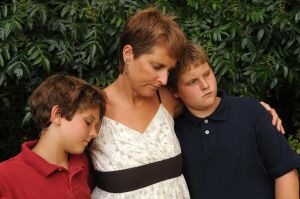 When someone dies, whether expected or not, people will grieve. Children who were close to the deceased are no exception, but it can be hard to decide whether they should attend the funeral or showing. The problem is, there is no easy answer to the question of children at funerals. Several factors determine whether a child is emotionally ready to handle such an event.
When someone dies, whether expected or not, people will grieve. Children who were close to the deceased are no exception, but it can be hard to decide whether they should attend the funeral or showing. The problem is, there is no easy answer to the question of children at funerals. Several factors determine whether a child is emotionally ready to handle such an event.
How Did the Child Know the Deceased?
Was the person who passed away a close family member such as a parent, sibling or grandparent? If so, you should consider letting your child go to the funeral regardless of his or her age. However, if the deceased is someone who did not know your child well, it may be more logical for him or her to stay home.
Have You Explained Death to Your Child?
If your son or daughter has never experienced the loss of a loved one before, you will need to explain exactly what death means. How you do this will depend on his or her age. It is best to keep your explanation as simple and honest as possible. Even very young children can easily tell when a parent is not telling the truth. Begin by asking what your son or daughter thinks death is and allowing him or her to express feelings and observations about what has happened to the deceased.
From there, you can offer a brief explanation of the circle of life. In the case of children, you should avoid phrases such as "sleeping" or "passed away" because these imply the dead can be brought back. Instead, simply explain that the loved one's heart stopped beating and he or she doesn't breathe anymore. Be willing to answer any questions your child has.
Have You Described What Your Child Will See at the Funeral?
If your child has never been to a funeral, he or she will not know what to expect and may end up surprised or scared, depending on the type of service being held. If the funeral will be traditional and have a closed casket, the explanation may be fairly simple. However, if it will be an open casket, or if the deceased will be cremated, you will need to provide further explanation. There are several other things you may consider bringing up in a conversation with your child.
- Burials
- Cemeteries
- Gravestones
- Caskets
- Funeral homes
- Hearses
- Obituaries
- Pallbearers
You should also explain what people do at a funeral, viewing or memorial. Talk about the eulogies, prayers, and songs that may be a part of the service and describe how people will laugh, cry and share memories of the person they all lost.
Have You Given Your Child Ideas for Processing Grief?
Just like adults process the death of a loved one in different ways, so do children. Help your son or daughter get through the loss of your loved one by asking to share memories, showing it is ok to cry or having him or her write poems, stories, or songs or draw pictures to lay with the deceased at the funeral.
Have You Asked Whether Your Child Wants to Go?
If your son or daughter doesn't want to attend the funeral and you want them to, consider explaining the importance of the event and why it would be special to the deceased. However, if he or she simply refuses, don't force the issue. Instead, consider recording some or all of the service in case your child decides he or she wants to see it in the future. Be available to talk as needed.
Ultimately, the decision of whether or not your child attends a funeral is up to you, but it is a good idea to seriously discuss the matter with your child. By allowing him or her to understand death and the process of a funeral, you help to ensure the experience is not more traumatic than it needs to be.
Add Your Comment